空巢老人外文翻译
空巢老人
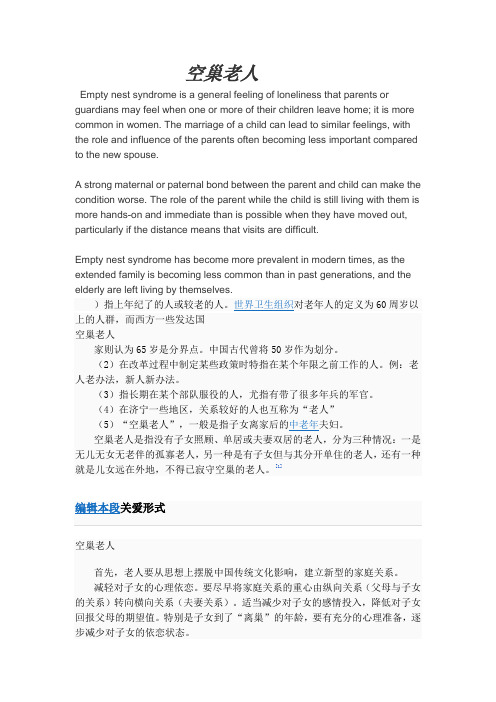
空巢老人Empty nest syndrome is a general feeling of loneliness that parents or guardians may feel when one or more of their children leave home; it is more common in women. The marriage of a child can lead to similar feelings, with the role and influence of the parents often becoming less important compared to the new spouse.A strong maternal or paternal bond between the parent and child can make the condition worse. The role of the parent while the child is still living with them is more hands-on and immediate than is possible when they have moved out, particularly if the distance means that visits are difficult.Empty nest syndrome has become more prevalent in modern times, as the extended family is becoming less common than in past generations, and the elderly are left living by themselves.)指上年纪了的人或较老的人。
空巢老人英语范文

空巢老人英语范文In the heart of our bustling cities, there lies a silent struggle. The elderly, once the backbone of our families, now find themselves alone in their homes, their children off to chase their dreams elsewhere.The concept of "empty nest" is not new, but its impact is growing. With the younger generation migrating for better opportunities, the elderly are left with memories and an echoing silence. Their once lively homes now stand as a testament to the passage of time, filled with photographs and stories that only walls can hear.The loneliness of the empty nest can be a catalyst for change. Some seniors find solace in hobbies, community activities, or even embracing technology to stay connected with their distant families. Yet, the longing for the warmth of human touch and the sound of familiar voices remains.It's a poignant reality that society must address. Initiatives to support the elderly, such as senior centers, home care services, and intergenerational programs, are steps in the right direction. They offer not just companionship but also a sense of purpose and community.However, the solution is not solely societal. It's a collective responsibility. Families must strive to bridge the distance, ensuring that their elderly loved ones feel valuedand included. Regular phone calls, video chats, and visits can make a world of difference.Moreover, the elderly themselves must be empowered to lead fulfilling lives. Education on self-care, health, and technology can enable them to navigate their new reality with confidence and independence.In conclusion, the phenomenon of empty nest syndrome is a multifaceted issue that requires a multifaceted approach.It's about understanding the emotional landscape of the elderly, providing them with the support they need, and ensuring that their golden years are not spent in isolation, but in the glow of love and respect they so richly deserve.。
空巢老人的英语作文4篇_0
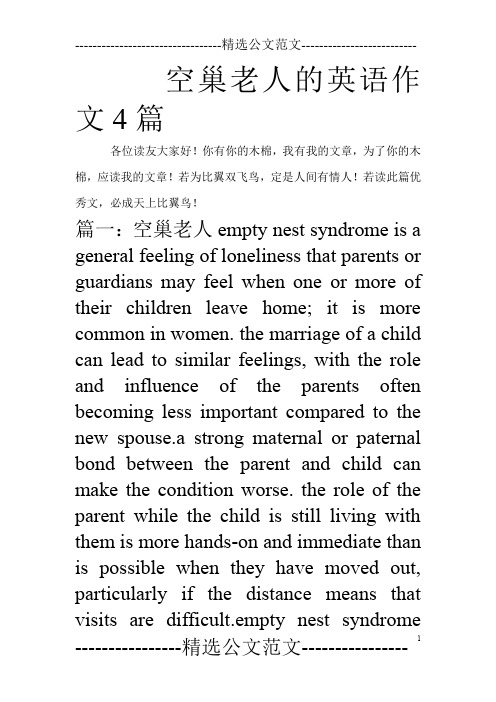
空巢老人的英语作文4篇各位读友大家好!你有你的木棉,我有我的文章,为了你的木棉,应读我的文章!若为比翼双飞鸟,定是人间有情人!若读此篇优秀文,必成天上比翼鸟!篇一:空巢老人empty nest syndrome is a general feeling of loneliness that parents or guardians may feel when one or more of their children leave home; it is more common in women. the marriage of a child can lead to similar feelings, with the role and influence of the parents often becoming less important compared to the new spouse.a strong maternal or paternal bond between the parent and child can make the condition worse. the role of the parent while the child is still living with them is more hands-on and immediate than is possible when they have moved out, particularly if the distance means that visits are difficult.empty nest syndromehas become more prevalent in modern times, as the extended family is becoming less common than in past generations, and the elderly are left living by themselves.篇二:空巢老人现象 a. topic: study the following cartoon carefully and write an essay on the topic of loving our parents.b. word limit: about 200 wordsc. your essay should meet the requirements below:1. describe the cartoon and the message conveyed2.draw a conclusion and give your comment on the cartoon. your essay must be written clearly.as is vividly depicts in the cartoon, old parents are sitting on the coach with disappointment and sadness, because no one comes back to celebrate with them. although they received a lot of presents from their children, they feel very miserable and have no appetite, since what they want most is not such material stuffs but the care and love from their children and grandchildren.nowadays, young menlook so busy and independent in modern society that they will never feel free to live with their parents. they move out and mind their own business every day. on usual days, they would not like to take their time to visit their parents with the excuses of busyness. on some festival days, they probably share a little time to drop in their parents or even just send some presents but don’t show up personally like what the cartoon above illustrates. they think that presents can represent their love, however, to the parents, who overcame a lot of difficulties to bring them up, those stuff are far away from what they really hope for.篇三:空巢老人with the deepening of the aging of society, there are a growing number of empty-nesters, which has become a social problem can not be ignored. when the children leave home due to reasons such as work, study, marriage, leaving their middle-aged parents at home,empty-nesters will produce the symptoms of mental disorders, known as the family “empty-nest”syndrome.someempty-nesters can live a good life after retire, especially those in city. most of them live in the same city with their children so that they can visit each other often. besides, they can participate in various group activities. for example, some middle-aged people attend to universities for the elderly for further study, while others join the choir or some other public service activities. by these activities, empty-nesters can eliminate of loneliness and realize their own values.各位读友大家好!你有你的木棉,我有我的文章,为了你的木棉,应读我的文章!若为比翼双飞鸟,定是人间有情人!若读此篇优秀文,必成天上比翼鸟!。
空巢老人写英语作文

空巢老人写英语作文Empty Nest Elderly。
The term "empty nest" refers to the stage in life when children have grown up and left home, leaving their parents with an "empty nest." This can be a challenging time for many elderly people, as they may feel lonely, isolated, and unsure of how to fill their time now that their children are no longer around.One of the biggest challenges that empty nest elderly face is loneliness. After spending years raising children and being surrounded by family, suddenly finding oneself alone can be a difficult adjustment. Many elderly people find that they miss the daily interactions and companionship that their children provided, and may struggle to find ways to fill the void left by their absence.In addition to loneliness, empty nest elderly may alsofeel a sense of loss and uncertainty about their future. Without the responsibility of caring for children, many elderly people may feel adrift and unsure of what to do with their time. They may struggle to find new hobbies or interests to pursue, and may feel as though they have lost their sense of purpose now that their children are no longer dependent on them.Despite these challenges, there are ways for empty nest elderly to cope with this stage of life and findfulfillment and happiness. One important step is to focus on building and maintaining relationships with friends and other family members. By staying connected with others, empty nest elderly can combat feelings of loneliness and isolation, and can continue to enjoy social interactions and companionship.Another important way for empty nest elderly to find fulfillment is to explore new hobbies and interests. Whether it's taking up a new sport, learning a new skill, or volunteering in the community, finding ways to stay active and engaged can help fill the void left by theabsence of children and provide a sense of purpose and fulfillment.Overall, while the empty nest stage of life can be challenging for many elderly people, it is also an opportunity for growth, self-discovery, and new experiences. By staying connected with others, exploring new interests, and finding ways to stay engaged and active, empty nest elderly can find fulfillment and happiness in this new chapter of their lives.。
空巢老人文献综述
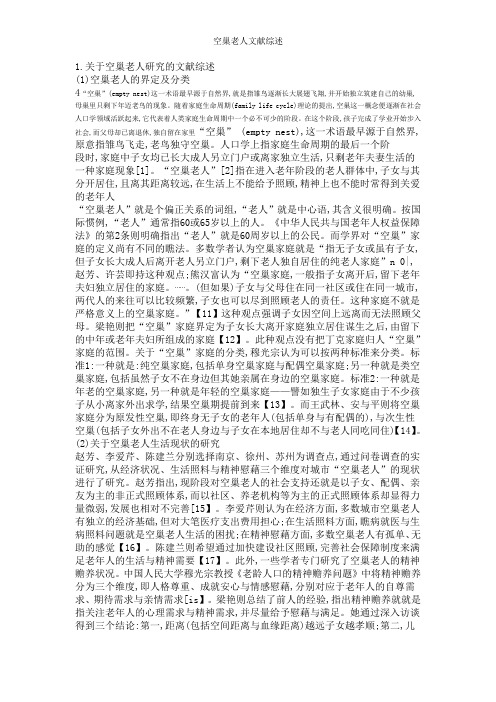
1.关于空巢老人研究的文献综述(1)空巢老人的界定及分类4“空巢”(empty nest)这一术语最早源于自然界,就是指雏鸟逐渐长大展翅飞翔,并开始独立筑建自己的幼巢,母巢里只剩下年迈老鸟的现象。
随着家庭生命周期(family life cycle)理论的提出,空巢这一概念便逐渐在社会人口学领域活跃起来,它代表着人类家庭生命周期中一个必不可少的阶段。
在这个阶段,孩子完成了学业开始步入社会,而父母却已离退休,独自留在家里“空巢” (empty nest),这一术语最早源于自然界,原意指雏鸟飞走,老鸟独守空巢。
人口学上指家庭生命周期的最后一个阶段时,家庭中子女均已长大成人另立门户或离家独立生活,只剩老年夫妻生活的一种家庭现象[1]。
“空巢老人”[2]指在进入老年阶段的老人群体中,子女与其分开居住,且离其距离较远,在生活上不能给予照顾,精神上也不能时常得到关爱的老年人“空巢老人”就是个偏正关系的词组,“老人”就是中心语,其含义很明确。
按国际惯例,“老人”通常指60或65岁以上的人。
《中华人民共与国老年人权益保障法》的第2条则明确指出“老人”就是60周岁以上的公民。
而学界对“空巢”家庭的定义尚有不同的瞧法。
多数学者认为空巢家庭就是“指无子女或虽有子女,但子女长大成人后离开老人另立门户,剩下老人独自居住的纯老人家庭”n 0|,赵芳、许芸即持这种观点;熊汉富认为“空巢家庭,一般指子女离开后,留下老年夫妇独立居住的家庭。
⋯⋯。
(但如果)子女与父母住在同一社区或住在同一城市,两代人的来往可以比较频繁,子女也可以尽到照顾老人的责任。
这种家庭不就是严格意义上的空巢家庭。
”【11】这种观点强调子女因空间上远离而无法照顾父母。
梁艳则把“空巢”家庭界定为子女长大离开家庭独立居住谋生之后,由留下的中年或老年夫妇所组成的家庭【12】。
此种观点没有把丁克家庭归人“空巢”家庭的范围。
关于“空巢”家庭的分类,穆光宗认为可以按两种标准来分类。
空巢老人英语作文
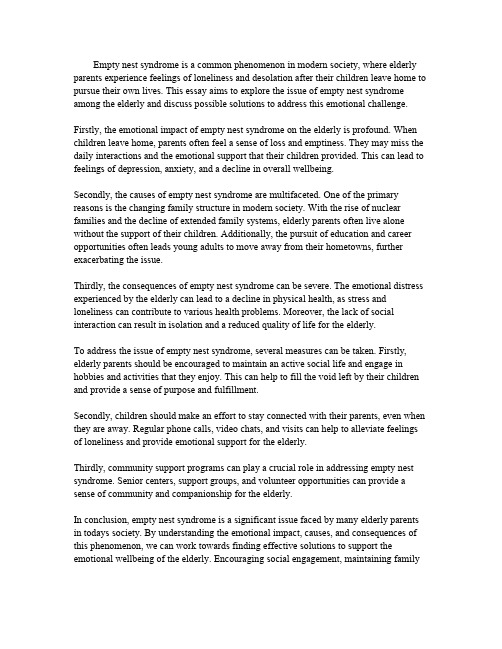
Empty nest syndrome is a common phenomenon in modern society,where elderly parents experience feelings of loneliness and desolation after their children leave home to pursue their own lives.This essay aims to explore the issue of empty nest syndrome among the elderly and discuss possible solutions to address this emotional challenge.Firstly,the emotional impact of empty nest syndrome on the elderly is profound.When children leave home,parents often feel a sense of loss and emptiness.They may miss the daily interactions and the emotional support that their children provided.This can lead to feelings of depression,anxiety,and a decline in overall wellbeing.Secondly,the causes of empty nest syndrome are multifaceted.One of the primary reasons is the changing family structure in modern society.With the rise of nuclear families and the decline of extended family systems,elderly parents often live alone without the support of their children.Additionally,the pursuit of education and career opportunities often leads young adults to move away from their hometowns,further exacerbating the issue.Thirdly,the consequences of empty nest syndrome can be severe.The emotional distress experienced by the elderly can lead to a decline in physical health,as stress and loneliness can contribute to various health problems.Moreover,the lack of social interaction can result in isolation and a reduced quality of life for the elderly.To address the issue of empty nest syndrome,several measures can be taken.Firstly, elderly parents should be encouraged to maintain an active social life and engage in hobbies and activities that they enjoy.This can help to fill the void left by their children and provide a sense of purpose and fulfillment.Secondly,children should make an effort to stay connected with their parents,even when they are away.Regular phone calls,video chats,and visits can help to alleviate feelings of loneliness and provide emotional support for the elderly.Thirdly,community support programs can play a crucial role in addressing empty nest syndrome.Senior centers,support groups,and volunteer opportunities can provide a sense of community and companionship for the elderly.In conclusion,empty nest syndrome is a significant issue faced by many elderly parents in todays society.By understanding the emotional impact,causes,and consequences of this phenomenon,we can work towards finding effective solutions to support the emotional wellbeing of the elderly.Encouraging social engagement,maintaining familyconnections,and providing community support are essential steps in addressing the challenges of empty nest syndrome.。
Empty Nest Elderly空巢老人
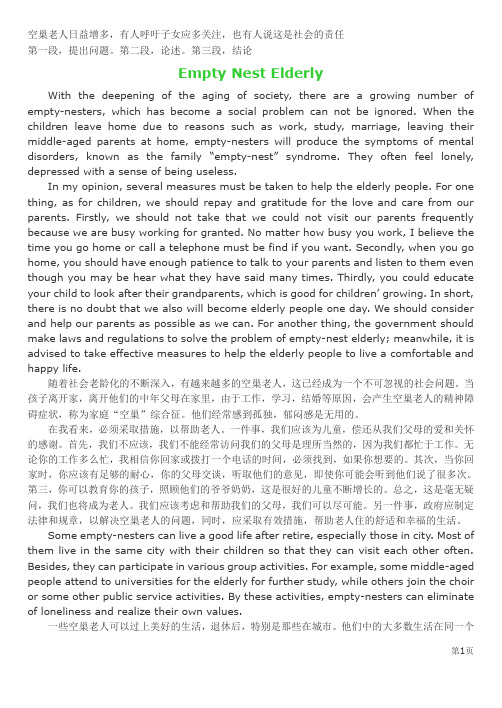
空巢老人日益增多,有人呼吁子女应多关注,也有人说这是社会的责任第一段,提出问题。
第二段,论述。
第三段,结论Empty Nest ElderlyWith the deepening of the aging of society, there are a growing number of empty-nesters, which has become a social problem can not be ignored. When the children leave home due to reasons such as work, study, marriage, leaving their middle-aged parents at home, empty-nesters will produce the symptoms of mental disorders, known as the family “empty-nest”syndrome. They often feel lonely, depressed with a sense of being useless.In my opinion, several measures must be taken to help the elderly people. For one thing, as for children, we should repay and gratitude for the love and care from our parents. Firstly, we should not take that we could not visit our parents frequently because we are busy working for granted. No matter how busy you work, I believe the time you go home or call a telephone must be find if you want. Secondly, when you go home, you should have enough patience to talk to your parents and listen to them even though you may be hear what they have said many times. Thirdly, you could educate your child to look after their grandparents, which is good for children’ growing. In short, there is no doubt that we also will become elderly people one day. We should consider and help our parents as possible as we can. For another thing, the government should make laws and regulations to solve the problem of empty-nest elderly; meanwhile, it is advised to take effective measures to help the elderly people to live a comfortable and happy life.随着社会老龄化的不断深入,有越来越多的空巢老人,这已经成为一个不可忽视的社会问题。
2016英语四级翻译预测空巢老人
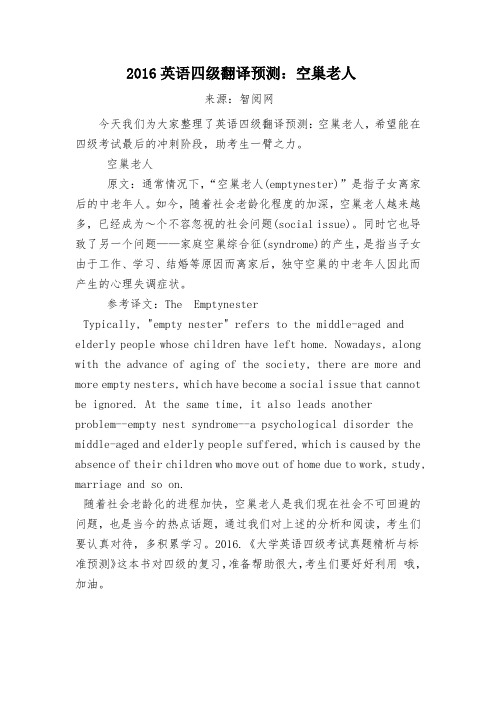
2016英语四级翻译预测:空巢老人来源:智阅网今天我们为大家整理了英语四级翻译预测:空巢老人,希望能在四级考试最后的冲刺阶段,助考生一臂之力。
空巢老人原文:通常情况下,“空巢老人(emptynester)”是指子女离家后的中老年人。
如今,随着社会老龄化程度的加深,空巢老人越来越多,已经成为~个不容忽视的社会问题(social issue)。
同时它也导致了另一个问题——家庭空巢综合征(syndrome)的产生,是指当子女由于工作、学习、结婚等原因而离家后,独守空巢的中老年人因此而产生的心理失调症状。
参考译文:The EmptynesterTypically, "empty nester" refers to the middle-aged and elderly people whose children have left home. Nowadays, along with the advance of aging of the society, there are more and more empty nesters, which have become a social issue that cannot be ignored. At the same time, it also leads anotherproblem--empty nest syndrome--a psychological disorder the middle-aged and elderly people suffered, which is caused by the absence of their children who move out of home due to work, study, marriage and so on.随着社会老龄化的进程加快,空巢老人是我们现在社会不可回避的问题,也是当今的热点话题,通过我们对上述的分析和阅读,考生们要认真对待,多积累学习。
空巢老人 英语作文
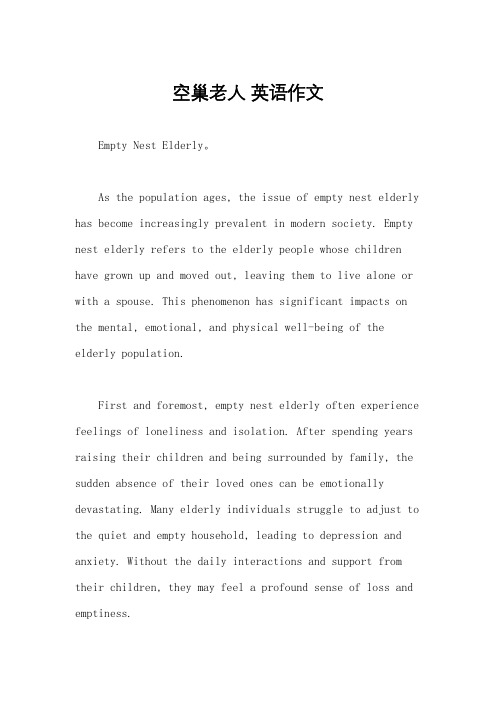
空巢老人英语作文Empty Nest Elderly。
As the population ages, the issue of empty nest elderly has become increasingly prevalent in modern society. Empty nest elderly refers to the elderly people whose children have grown up and moved out, leaving them to live alone or with a spouse. This phenomenon has significant impacts on the mental, emotional, and physical well-being of the elderly population.First and foremost, empty nest elderly often experience feelings of loneliness and isolation. After spending years raising their children and being surrounded by family, the sudden absence of their loved ones can be emotionally devastating. Many elderly individuals struggle to adjust to the quiet and empty household, leading to depression and anxiety. Without the daily interactions and support from their children, they may feel a profound sense of loss and emptiness.Moreover, the absence of their children may also result in a lack of emotional and physical support for the elderly. As they age, they may require assistance with daily tasks, such as grocery shopping, meal preparation, and household chores. Without their children around, they may struggle to maintain their independence and quality of life. Additionally, in the event of illness or emergencies, empty nest elderly may not have immediate access to the care and support they need, leading to increased vulnerability and health risks.Furthermore, empty nest elderly often face financial challenges. With the departure of their children, they may lose the financial support and assistance that theirchildren once provided. This can be particularly burdensome for elderly individuals who are living on a fixed income or struggling to make ends meet. The lack of financial resources and support from their children can exacerbate their feelings of insecurity and uncertainty about the future.In response to the growing issue of empty nest elderly, it is crucial for society to provide support and resources for this vulnerable population. Community-based initiatives, such as senior centers, support groups, and volunteer programs, can help combat the loneliness and isolation experienced by empty nest elderly. These programs can provide opportunities for socialization, companionship, and recreational activities, which are essential formaintaining mental and emotional well-being.Additionally, there is a need for increased access to healthcare and social services for empty nest elderly. By ensuring that elderly individuals have access to affordable and quality healthcare, as well as support services fordaily living, society can help alleviate the physical and emotional burdens experienced by empty nest elderly. This may involve implementing policies and programs thatprioritize the needs of the elderly population and provide them with the necessary resources and support.Furthermore, it is important for families to maintain regular contact and communication with their elderlyparents, even after they have moved out. Simple gestures, such as regular phone calls, visits, and family gatherings, can go a long way in alleviating the feelings of loneliness and isolation experienced by empty nest elderly. By staying connected and involved in their parents' lives, adult children can provide emotional support and reassurance to their elderly parents.In conclusion, the issue of empty nest elderly is a significant and growing concern in today's society. The emotional, physical, and financial challenges faced by elderly individuals living alone or with a spouse can have profound impacts on their well-being. It is imperative for communities, governments, and families to come together to provide support and resources for empty nest elderly, ensuring that they can age with dignity, security, and a sense of belonging. By addressing the needs of this vulnerable population, we can create a more compassionate and inclusive society for all.。
空巢老人的英语作文
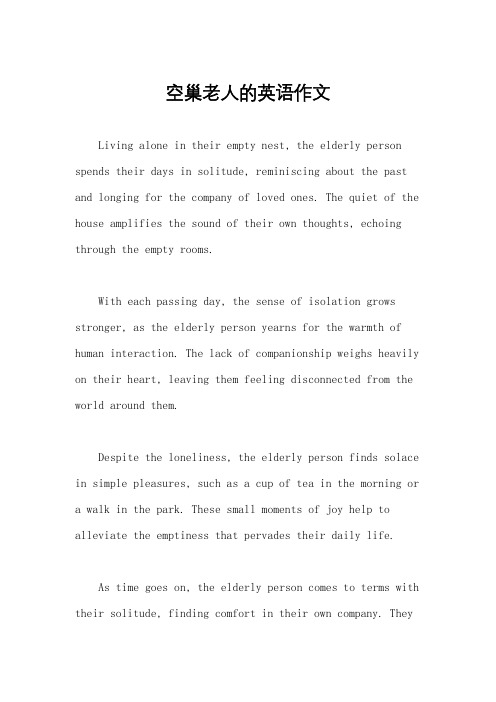
空巢老人的英语作文Living alone in their empty nest, the elderly person spends their days in solitude, reminiscing about the past and longing for the company of loved ones. The quiet of the house amplifies the sound of their own thoughts, echoing through the empty rooms.With each passing day, the sense of isolation grows stronger, as the elderly person yearns for the warmth of human interaction. The lack of companionship weighs heavily on their heart, leaving them feeling disconnected from the world around them.Despite the loneliness, the elderly person finds solace in simple pleasures, such as a cup of tea in the morning or a walk in the park. These small moments of joy help to alleviate the emptiness that pervades their daily life.As time goes on, the elderly person comes to terms with their solitude, finding comfort in their own company. Theylearn to appreciate the quiet moments, embracing the freedom that comes with living alone in their empty nest.In the end, the empty nest becomes a sanctuary for the elderly person, a place of peace and reflection. They may be alone, but they are not lonely, finding contentment in the stillness of their surroundings.。
空巢老人英语作文
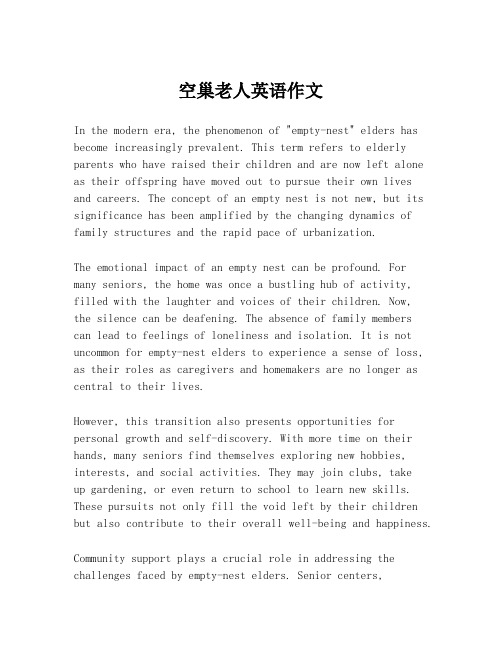
空巢老人英语作文In the modern era, the phenomenon of "empty-nest" elders has become increasingly prevalent. This term refers to elderly parents who have raised their children and are now left alone as their offspring have moved out to pursue their own lives and careers. The concept of an empty nest is not new, but its significance has been amplified by the changing dynamics of family structures and the rapid pace of urbanization.The emotional impact of an empty nest can be profound. For many seniors, the home was once a bustling hub of activity, filled with the laughter and voices of their children. Now,the silence can be deafening. The absence of family members can lead to feelings of loneliness and isolation. It is not uncommon for empty-nest elders to experience a sense of loss, as their roles as caregivers and homemakers are no longer as central to their lives.However, this transition also presents opportunities for personal growth and self-discovery. With more time on their hands, many seniors find themselves exploring new hobbies, interests, and social activities. They may join clubs, takeup gardening, or even return to school to learn new skills. These pursuits not only fill the void left by their children but also contribute to their overall well-being and happiness.Community support plays a crucial role in addressing the challenges faced by empty-nest elders. Senior centers,community programs, and volunteer opportunities can provide a sense of belonging and purpose. It is important for society to recognize the value of intergenerational connections and to foster environments where elderly individuals can continue to contribute and feel valued.In conclusion, the experience of being an empty-nest elder is a complex one, marked by both the pangs of loneliness and the potential for new beginnings. It is a time that calls for societal empathy and support, as well as personal resilience and adaptability. By embracing change and seeking out connections, empty-nest elders can find fulfillment and joyin the next chapter of their lives.。
空巢老人作文英语作文

空巢老人作文英语作文Empty Nest Elderly。
Living alone as an elderly person can be tough. It's not just about the physical challenges, but also the emotional ones. The house that used to be filled with laughter and chatter is now quiet and empty. It's a strange feeling, like a part of you is missing.You start to miss the sound of footsteps running down the hallway, the smell of home-cooked meals wafting through the air, and the warmth of having your loved ones around you. The loneliness can be overwhelming at times, and it's hard to shake off the feeling of emptiness.But despite the challenges, there are also moments of peace and quiet that can be quite comforting. You have the freedom to do whatever you want, whenever you want. You can indulge in your hobbies, take long walks, or simply sit and enjoy the silence. It's a different kind of solitude, onethat allows you to rediscover yourself and find new meaning in life.Of course, there are days when you long for company, when you wish someone would drop by for a chat or a cup of tea. It's during these moments that the emptiness of the house becomes almost unbearable. You realize how much you miss the presence of others, and how much you crave human connection.But as time goes by, you learn to adapt to this new way of life. You find ways to stay connected with your friends and family, whether it's through phone calls, video chats, or occasional visits. You also build new routines and habits that bring joy and fulfillment into your daily life.Ultimately, being an empty nest elderly person is a mixed bag of emotions. There are moments of loneliness and longing, but also moments of peace and self-discovery. It's a journey of ups and downs, but one that can be navigated with resilience and a positive outlook.。
空巢老人 英语作文
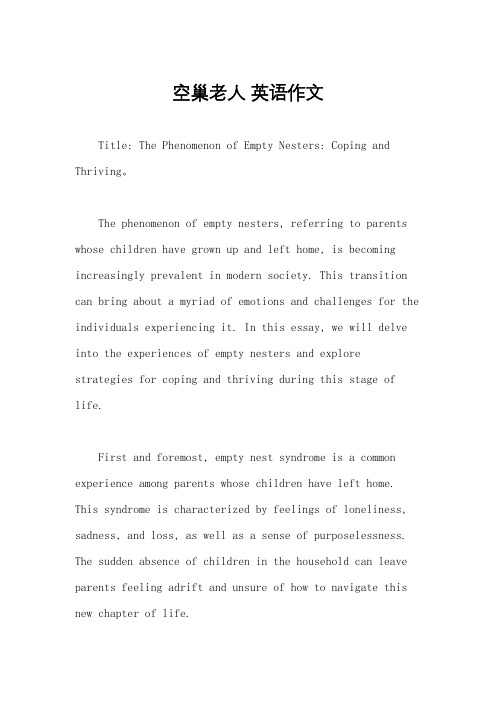
空巢老人英语作文Title: The Phenomenon of Empty Nesters: Coping and Thriving。
The phenomenon of empty nesters, referring to parents whose children have grown up and left home, is becoming increasingly prevalent in modern society. This transition can bring about a myriad of emotions and challenges for the individuals experiencing it. In this essay, we will delve into the experiences of empty nesters and explorestrategies for coping and thriving during this stage of life.First and foremost, empty nest syndrome is a common experience among parents whose children have left home. This syndrome is characterized by feelings of loneliness, sadness, and loss, as well as a sense of purposelessness. The sudden absence of children in the household can leave parents feeling adrift and unsure of how to navigate this new chapter of life.However, it's important to recognize that empty nest syndrome is not inevitable, and there are many ways for individuals to cope with and even embrace this transition. One strategy is to focus on self-care and personal fulfillment. Empty nesters can take this opportunity to prioritize their own needs and interests, whether it be pursuing hobbies, furthering their education, or engagingin volunteer work.Additionally, maintaining strong social connections is crucial for combating feelings of loneliness and isolation. Empty nesters can seek out opportunities to connect with friends, family members, and community groups. Building a support network can provide emotional support and companionship during this period of adjustment.Furthermore, empty nesters can use this time to strengthen their relationships with their partners. With children out of the house, couples have the opportunity to reconnect and rediscover each other. Planning date nights, taking up new activities together, and engaging in opencommunication can help strengthen the bond between partners and create a fulfilling relationship dynamic.Another important aspect of coping with empty nest syndrome is reframing one's perspective. Instead of focusing solely on the loss of having children at home, empty nesters can view this transition as a new chapter filled with opportunities for growth and self-discovery. Embracing this stage of life as a time for personal development and exploration can help individuals find meaning and purpose beyond their roles as parents.In conclusion, the experience of becoming an empty nester is a significant life transition that can elicit a range of emotions and challenges. However, with the right strategies and mindset, individuals can navigate this transition with resilience and optimism. By prioritizing self-care, nurturing social connections, strengthening relationships, and reframing one's perspective, empty nesters can not only cope with this stage of life but also thrive and find fulfillment in the process.。
空巢老人英语作文
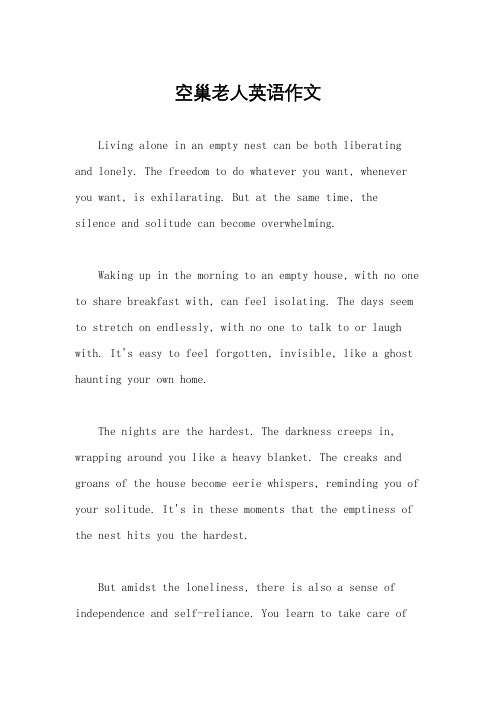
空巢老人英语作文Living alone in an empty nest can be both liberating and lonely. The freedom to do whatever you want, whenever you want, is exhilarating. But at the same time, the silence and solitude can become overwhelming.Waking up in the morning to an empty house, with no one to share breakfast with, can feel isolating. The days seem to stretch on endlessly, with no one to talk to or laugh with. It's easy to feel forgotten, invisible, like a ghost haunting your own home.The nights are the hardest. The darkness creeps in, wrapping around you like a heavy blanket. The creaks and groans of the house become eerie whispers, reminding you of your solitude. It's in these moments that the emptiness of the nest hits you the hardest.But amidst the loneliness, there is also a sense of independence and self-reliance. You learn to take care ofyourself, to cook for one, to entertain yourself. You become your own best friend, learning to enjoy your own company and appreciate the quiet moments of solitude.And then there are the unexpected joys of living alone. The freedom to decorate your space however you like, to watch whatever you want on TV, to dance around the living room in your pajamas without a care in the world. There is a certain beauty in the simplicity of solitude.So, while living in an empty nest may have its challenges, it also has its rewards. It's a time to rediscover yourself, to learn to be comfortable in your own skin, and to appreciate the little moments of joy that come from living life on your own terms.。
空巢老人英文文案
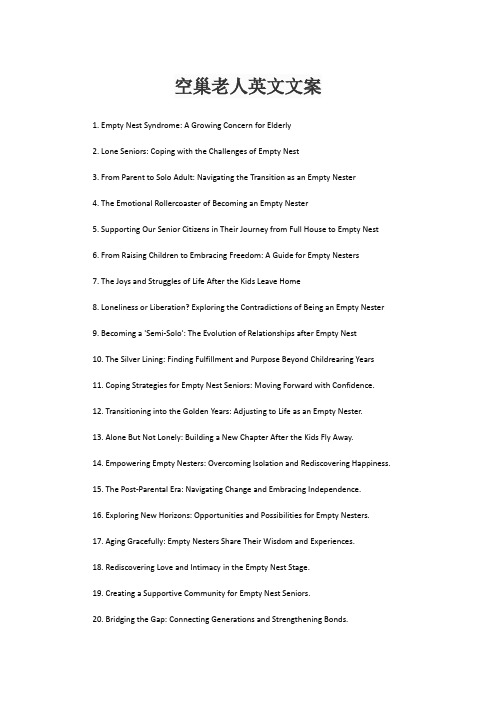
空巢老人英文文案1. Empty Nest Syndrome: A Growing Concern for Elderly2. Lone Seniors: Coping with the Challenges of Empty Nest3. From Parent to Solo Adult: Navigating the Transition as an Empty Nester4. The Emotional Rollercoaster of Becoming an Empty Nester5. Supporting Our Senior Citizens in Their Journey from Full House to Empty Nest6. From Raising Children to Embracing Freedom: A Guide for Empty Nesters7. The Joys and Struggles of Life After the Kids Leave Home8. Loneliness or Liberation? Exploring the Contradictions of Being an Empty Nester9. Becoming a 'Semi-Solo': The Evolution of Relationships after Empty Nest10. The Silver Lining: Finding Fulfillment and Purpose Beyond Childrearing Years11. Coping Strategies for Empty Nest Seniors: Moving Forward with Confidence.12. Transitioning into the Golden Years: Adjusting to Life as an Empty Nester.13. Alone But Not Lonely: Building a New Chapter After the Kids Fly Away.14. Empowering Empty Nesters: Overcoming Isolation and Rediscovering Happiness.15. The Post-Parental Era: Navigating Change and Embracing Independence.16. Exploring New Horizons: Opportunities and Possibilities for Empty Nesters.17. Aging Gracefully: Empty Nesters Share Their Wisdom and Experiences.18. Rediscovering Love and Intimacy in the Empty Nest Stage.19. Creating a Supportive Community for Empty Nest Seniors.20. Bridging the Gap: Connecting Generations and Strengthening Bonds.。
空巢老人英语作文
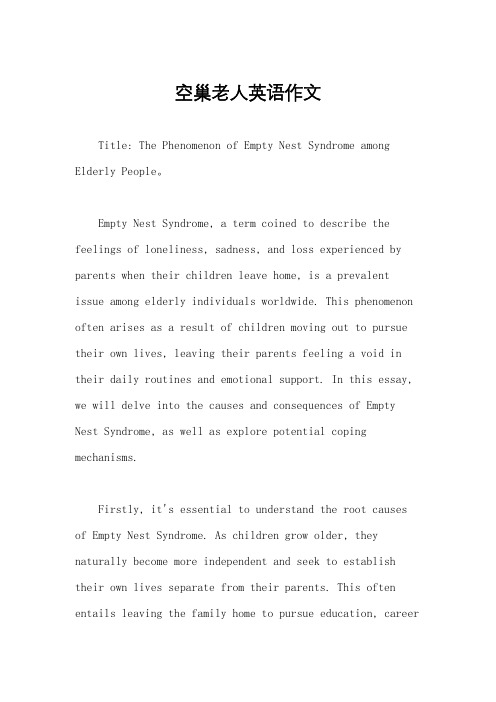
空巢老人英语作文Title: The Phenomenon of Empty Nest Syndrome among Elderly People。
Empty Nest Syndrome, a term coined to describe the feelings of loneliness, sadness, and loss experienced by parents when their children leave home, is a prevalent issue among elderly individuals worldwide. This phenomenon often arises as a result of children moving out to pursue their own lives, leaving their parents feeling a void in their daily routines and emotional support. In this essay, we will delve into the causes and consequences of Empty Nest Syndrome, as well as explore potential coping mechanisms.Firstly, it's essential to understand the root causes of Empty Nest Syndrome. As children grow older, they naturally become more independent and seek to establish their own lives separate from their parents. This often entails leaving the family home to pursue education, careeropportunities, or personal relationships. While this transition is a normal part of life, it can be emotionally challenging for parents, particularly those who have devoted much of their lives to raising their children.Moreover, societal changes have contributed to the prevalence of Empty Nest Syndrome. In modern society, there is an increasing emphasis on individualism and self-reliance, which encourages young adults to assert their independence at an earlier age. Additionally, factors such as urbanization and globalization may lead to children relocating to different cities or even countries, further exacerbating feelings of separation for their parents.The consequences of Empty Nest Syndrome can be significant and varied. Many elderly individuals experience feelings of loneliness, as the bustling family home they once knew becomes quiet and empty. The loss of daily interaction with their children can also lead to a sense of purposelessness and a lack of fulfillment. Furthermore, some parents may struggle with identity issues, as their roles as caregivers diminish, leaving them uncertain abouttheir place in the world.However, it's important to note that Empty Nest Syndrome is not inevitable, and there are ways for elderly individuals to cope with these feelings. One effective strategy is to focus on self-care and personal growth. This can involve pursuing hobbies and interests that were previously put on hold due to parental responsibilities, as well as investing time and energy into maintaining social connections with friends and other family members.Additionally, seeking professional support can be beneficial for individuals struggling with Empty Nest Syndrome. Therapists and counselors can provide a safe space for parents to express their feelings and explore coping strategies. Support groups comprised of individuals experiencing similar challenges can also offer valuable solidarity and encouragement.Furthermore, embracing the newfound freedom that comes with an empty nest can lead to a renewed sense of purpose and fulfillment. Parents can take advantage of thisopportunity to rediscover themselves, set new goals, and pursue new experiences. By reframing this life stage as a period of personal growth and exploration, individuals can mitigate the negative effects of Empty Nest Syndrome and embrace the next chapter of their lives with optimism and resilience.In conclusion, Empty Nest Syndrome is a common and understandable phenomenon experienced by many elderly individuals when their children leave home. While the feelings of loneliness and loss associated with this transition can be challenging, there are various coping mechanisms available to help individuals navigate this life stage with grace and resilience. By focusing on self-care, seeking support, and embracing new opportunities, elderly individuals can thrive in the empty nest phase of their lives.。
空巢老人 英文p
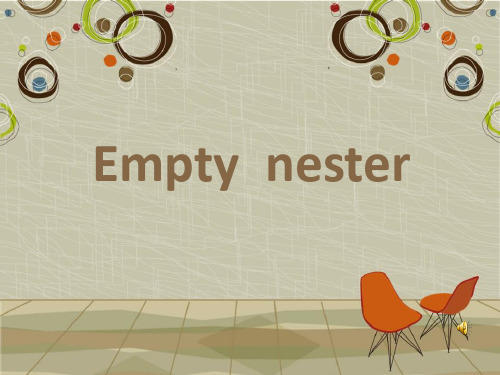
In China, There is such a group of people.
The old man peered 凝视 at the door.
The old man is lonely and helpless.
The so-called "empty nest", refers to the
The end
children grow up in successபைடு நூலகம்on from the
parents separated, only older generation
一代人
of living alone in the home.
空巢是指家庭中因子女外出工作学习老人独居的一种现象。 所谓“空巢”,是指子女长大成人后从父母家庭中相继分离 出去,只剩下老年一代人独自生活的家庭。
Then How to solve this problem ?
1. Children should help the elderly parents arrange their daily life, maintain and parents contact.
保持
2 .The government should strengthen 加强 the work of aging, the development and perfection of pension institution. 完善 养老机构
3 .Community organizations relevant departments on-site service ,convenient for the life 方便 of the elderly.
- 1、下载文档前请自行甄别文档内容的完整性,平台不提供额外的编辑、内容补充、找答案等附加服务。
- 2、"仅部分预览"的文档,不可在线预览部分如存在完整性等问题,可反馈申请退款(可完整预览的文档不适用该条件!)。
- 3、如文档侵犯您的权益,请联系客服反馈,我们会尽快为您处理(人工客服工作时间:9:00-18:30)。
外文翻译题目城市空巢老人生活状况分析与社工介入路径思考学生姓名孔兢专业班级社会工作08-1 学号 200809020115 院(系)政法学院指导教师(职称)胡莹(讲师)完成时间 2012年 5月25日谁为中国人养老?——中国独生子女政策所带来的问题及对策1摘要早在1979年,中国计划生育政策(简称OCP)颁布实施,旨在降低中国的生育率。
从那时起,就有大量的关于计划生育政策导致了中国人口老龄化的研究。
逐渐上升的中国老年人群体比例正产生深刻的社会和经济并发症,这种情况势必要通过相关政策的出台才能缓解。
本文采用一种新视角来讨论这个问题,聚焦于夹在“三明治”中间的一代——即必须要赡养老人、抚养孩子的那代人。
此研究收集到的定性数据试图从另一个视角看待这种人口结构变化的后果,并找到合适的问题解决办法。
但是我们可以确定的是,城市地区的可能选择会比较多,而在乡村地区,可供大量老年群体的选择越来越少。
2引言在过去的几十年,中国经历了生育率的下降和寿命的增加,两种人口指标显示中国正在为一个老龄化社会。
虽然大多数学者同意,人口增长放缓较之于人口爆炸会导致更少的社会变迁(科尔,1986),持续的低生育率也无形中影响了社会变迁和经济发展,尤其是像中国的这种发展中国家,这种作用不容忽视。
本文通过研究人口结构的变化,尤其是家庭结构和家庭护理模式的研究,将焦点放在独生子女政策和老龄人口之间的联系上。
正如我们所记录的这些改变,我们也为这些新的挑战确定对策。
这将通过分析从三明治,即要赡养中间一代收集而来的定性信息而确定。
虽然众多的老龄人口学家,[沃德Spitze,1998]和曾[1991])强调对三明治一代进行研究的重要性,特别是在老龄问题的研究上,但是相关的研究却很少。
我们的此次研究正试图填补这一空白,并且以独特的视角探索减轻老龄化后果的可行性措施。
这项研究重新审视了中国近年来人口和经济所经历的转变,尤其注重逐渐增加的老年群体比例和由此引发的文化、社会、经济问题。
其次,我们通过所获得的数据来分析社会变迁。
最后,我们讨论了可能的解决方案,可以减轻中国老年人的养老难问题。
3 研究意义据统计,截止到2000年,中国人口近13亿,年平均增长率为1.1%(中国国家统计局,2001)。
从1950年到2003年的人口预期寿命从41岁提高到71岁(郑,2004;人口参考局,2004)。
倘若,这种模式持续下去,到2040年60岁以上的将达到400万。
这个数字意味着世界总人口的26%,甚至比法国、德国、意大利、日本和英国的总人口还要多(杰克逊,2004和张,2001)。
这种从相对年轻到老龄人口的转变是前所未有的(张,2001)。
此外,这种老龄化影响需要加以解决,因为他们对中国国民的生活将产生更为深远的影响。
早在1949年,中国共产党执政时,不仅人口年轻化,总人口也少于如今的一半,只有541.7。
那时,中国领导人还没意识到控制人口数量的重要性。
毛泽东认为,越来越多的人口数量意味着更多的人参与到反对资本主义的阵营中,并建立更强大的社会主义国家。
而中国新马尔萨斯主义对此的警告被扼杀,这导致了在接下来的25年间,中国的人口翻了一番。
然而,到1971年,毛泽东意识到需要鼓励计划生育并发起万新邵方案以促进晚婚,扩大代际间隔。
但是,人口增长持续。
结果,在1979年实施了独生子女政策。
因此,中国的生育率从1963年的7.5(波士顿,2000)到2003年的1.7(PRB,2004)。
现如今,大多数中国人承认中国确实存在人口过多的问题(王,1999)。
中国政府所宣传的宣传“少生优育”的观点很显然已经成为一种主流价值观念根植于人们的大脑中(格林哈尔希和邦加茨,1987)。
城镇居民首先调整了OCP。
接下来,农民也已经从违抗转向接受,由不理解转变为逐渐意识到OCP的重要性。
由于传统的压迫教育,大部分农村妇女并未接受过教育,90%的农村人口不是文盲就是半文盲,因此,这样的变化是相当惊人的(Chesnais&王,1990)。
此外,尽管城市化进程加快,中国仍然为农业大国(PRB,2004),由于家庭仍然是农村老人养老的重要经济来源,这样的人口组成势必使老年群体成为受OCP政策影响最大的群体之一(格林哈尔希&邦加茨,1987)。
受独生子女政策影响的另一部分人口是没有男性后代的家庭。
正如我们下面所讨论的,最年长的儿子和他的配偶传统上承担着赡养年迈父母的职责(格林哈尔希&邦加茨,1987)。
因此,为确保自己的养老问题,一些家庭已经开始采取一些措施。
在2000年,中国的男女性别比为1.17:1(中国国家统计局,2001)。
而全球出生婴儿性别比始终在1.05:1。
中国极高的出生性别比不可能是自然发生的,他的出现原因是多层次的(托马斯,1995)。
失踪女童的常见解释为溺杀女婴(科尔&巴尼斯,1994)。
暂且不管性别失衡的具体原因,但是我们相信这种差别受政府的独生子女政策影响,这将对老年养老产生重要影响,特别是由于女孩的缺乏,将导致更多的单身汉和更少的儿媳妇来为他们养老。
更令人不安的是,有研究显示,男性后代的家庭义务感最弱(FULIGNI&张,2004)。
失踪的中国女童的长期影响是不确定的,她们的缺席肯定会影响中国老人所获得养老的质量和数量。
总之,中国的传统养老模式正在经历很多变革。
历史悠久的联合家庭已被核心家庭取代(曾,1991)。
家庭义务感也逐渐被削弱(Fulifni&张,2004)。
正是如此,老年人的养老问题变得更为迫切。
除了近来中国的人口结构的变化,中国也经济也经历着从计划到市场的转型,在20世纪70年代末开始经济转型以来,一些群体受益很多,即使城市地区失业率高,许多居民丧失了他们的传统优势,一般的,经济改革对城市存有偏见,城市被视为经济繁荣的发动机,由此也获得丰厚的待遇,如食物和住房补贴(艾,1993和赵、陈,2004)。
然而,在农村地区,医疗体系崩溃和预先存在的城市收入差距变得更为明显。
正如很多不发达的国家一样,中国同样面临着经济发展和快速的人口结构变化的挑战,正是如此,中国遏制农村人口向城市迁移,性别比失衡,老龄化,高失业率,城乡不平等,并积极遏制像其他不发达国家一样的城市动荡。
因为中国的快速老龄化已经给脆弱的社会保障体系带来巨大压力。
从90年代初,中国政府就致力于建立更适合市场经济发展的养老体系。
目前,中国的养老保障体系覆盖政府单位和国有企业的员工,正因如此,2002年,中国的养老保障体系只覆盖了城市劳动力的45%。
而农村地区则会更少。
而中国是一个农业大国,这意味着只有不到25%的劳动力享有保障体系。
中国政府意识到在21世纪的头20年是建立养老保障体系的关键时期,但是如何做尚未定论。
多数学者同意改革按劳分配制度,建立社会保障体系。
然而,取而代之的是全面资助系统或者两个系统的某些结合,这本身就是一个大挑战。
可行的修改措施会使得社会保障体系更为持久,这其中就包含了将退休年龄从55推后到60岁。
其他的可行措施则包括逐渐降低收入替代率、扩大覆盖范围使之包含城市和乡村。
但是,所有的措施不可能一蹴而就,因为他们容易带来很多并发症,更易使政府陷入财政危机。
正是这样,谁来为中国人养老?尤其是农村地区。
4问题及对策中国独生子女政策不可避免的后果之一是人口老龄化问题,低于更替水平的生育率、降低死亡率和延长预期寿命这一系列问题使得中国进入老龄社会,而如何应对这一问题势必让我们在这片古老的土地见证前所未有的挑战。
这个研究特别专注于OCP 所带来的人口变化,探讨了家庭结构的变化、养老服务的提供,并试图回答“谁来赡养中国老人?”因为由扩大家庭所带来的传统养老方式不仅不再是大部分中国人的选择,而是整个国家的重要议题。
我们在访谈中发现,大部分家长,尤其是在城市地区,认为一个孩子供养两个父母,四个祖父母(即4-2-1模式)是不可能的。
基于此,有经济能力的父母现在就为他们的未来做打算,然而,有这种经济能力的大都在城市地区,当然,这并不是表明了所有的城市居民都有这种能力。
相反,占人口绝大多数的农村人口并没有能力这样做。
尽管这项研究并非对所有的中国老人都具有适应性,我们的访谈确实显示出了农村和城市地区老年服务的差异。
在城市,我们建议扩大已经存在的社区居委会的覆盖范围,为老年人提供更优质的服务。
由于城市居委会的标准尚未建立,这应该在适当时候以上海模式为试点建立起来,吸取成功之处,进而推广。
在上海,可以建立志愿服务队伍为老年人提供服务,让年轻的志愿者帮助老人。
这个方案的成本很低,但却是高效的。
在居委会的帮助下,养老服务不再依靠家庭成员。
对于那些不幸没有居住在居委会附近的人,机构养老是另外一种可行性的选择。
越来越多的中国人接受机构养老作为一种养老模式,随着越来越多的人熟悉机构养老,选择自愿搬迁到这些设施的老年人也越来越多。
同样,新建教堂和养老院的增加也使得机构养老成为一种可行选择。
然而,只有提升养老院的活动成效并使之推广,才可以消除居民的疑虑,使机构养老得以推广。
当然,一个人所在的养老院的服务质量可能会有助于对他们的照顾。
另一个决定人们选择的是养老保险。
这种养老金计划在城市中很受欢迎,被很多有能力的老年人购置。
但是,这对于那些在农村地区的几乎没有资源的贫困老人,则仍然要依靠家庭养老,倘若家庭养老服务无法提供,则只能靠政府救助度过晚年。
农村居民养老服务的提供远比城市带来更多挑战,由于有能力的年轻人向外移民,使得农村的老年相对人数更多。
此外,城市老年护理选择,如养老院、退休金计划等并未在农村地区实行,使得在农村地区传统的孝观念依然占据主流价值观,因此,家庭依然是在农村养老模式中占据主要地位,目前为止,60%以上的农村地区的老年人生活在多代家庭提供的养老服务中。
与孝道相关的价值观念一直在强化,比如,1980年颁布的《婚姻法》,这项法律的目的是要加强家庭成员对老人的照顾,即孩子和孙子需要照顾他们的父母和祖父母的传统观念。
通过观察可发现,在中国的一些农村地区,一些年轻夫妇开始和妻子的父母共同居住,这一改变不仅可以促使中国人传统性别观念的改变,还能衍生出更多的养老选择。
政府的额外救助,也将会帮助老年人应对已经并将继续经历的社会、经济变革。
但是,由于财政拮据,这一措施不会在短时间内实施。
尽管如此,只要存在着城乡差异,大规模的年轻一代就会向城市迁移。
而家庭养老是农村养老的唯一模式,这也急需解决。
因此,政府的一个长期目标必须要缩小城乡差异。
这是一个很大的挑战,需要很多的财力,很长的时间才能解决。
在此期间,应该大力提高农村人口尤其是女性的教育水平,并把城市的低保制度应用到农村,这些制度有助于使年轻的农村人口留在当地。
在1991年,一些农村地区开始实行养老保险制度,而现在需要达到广覆盖,并被所有人认知。
